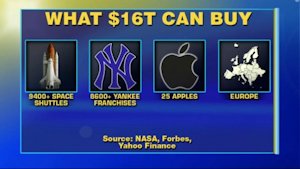
The Candidates and the Economy 2012
The American economy is in rough shape. Unemployment stubbornly sits above eight percent, gas prices (and thus food prices and everything else) are way up, the Fed keeps risking massive future inflation with repeated quantitative easing, our credit rating has been downgraded for the first time, bonds are now far riskier than commodity speculation, Congress is gridlocked into inaction, the national debt exceeds $16 trillion, and uncertainty lords over all, preventing us from being in a true recovery. There's plenty of blame to go around for how we got here, but the solutions need not be all that complex. I don't believe the president has enough sway to right the ship on his own, but a fundamental understanding of how the American economy works could go a long way to addressing the real problems instead of encouraging the ignorance most people have of basic economic principles.
 | | Only in America could this ludicrously rich guy claim to understand the middle class better than that other ludicrously rich guy |
For the purposes of this exercise, I am not interested in the blame game; it's irrelevant. Instead, let me explain what I believe needs to be done to fix things. For starters, the government needs to stop spending so much of our money. If this means defense cuts and entitlement reform, so be it. The debt cannot continue to rise at the current rate, or else we will not have much of an economy to leave our children. This is a much bigger deal than the War on Terror or whether or not I will get a Social Security check in forty years. Additionally, the government needs to find ways to decrease uncertainty in the marketplace by stopping the Fed's reckless actions and simplifying--if not drastically reducing--the regulatory laws that are weighing down small businesses. We need a tax code that makes sense and is transparent, and finally, we need to stop pretending that subsidies and tax tinkering will magically lower the unemployment rate.
Before things turned sour near the end of the election season, the economy really wasn't a big deal during the 2008 campaigns. This year, it is easily the most important issue on the minds of most Americans, likely the decisive issue. The two candidates have made the choice perfectly clear, and I admit before I begin that I would be greatly surprised if Romney doesn't come out far ahead in my estimation. I will try as hard as I can to avoid confirmation bias, but I'll be honest with you: it's not going to be easy.
The Budget & National Debt
$16 trillion. $16 trillion! That's beyond ludicrous, and it's difficult to find the words that adequately express how bad it is. The worst part is that the president and Congress have been unable to do anything about it aside from tiny, practically meaningless "cuts" to future spending in exchange for massive increases in the debt ceiling. The Republican-controlled House has passed a handful of budgets that attempt to tackle the problem by some insanely distant future deadline, and over in the Senate, the Democratic majority hasn't passed a budget at all in several years. The only bipartisan fiscal action taken in the last two years has been the unanimous rejection of Obama's proposed budgets. Neither side of the aisle is proving itself to be serious on this issue, and nobody seems able to stop the government's lead foot from accelerating us closer and closer to the fiscal cliff. My ideal candidate would be shouting from the mountaintops to stop this madness and restore some kind of financial sanity to Washington's checkbook, but I honestly don't believe the majority of voters would be willing to listen to somebody tell them how bad it really is and how drastically we need to act. I'm not going to get into a Keynesian or Hamiltonian argument about the necessity of national debt, but even if our country needs to run in the red to be healthy, it clearly does not need to be running in it so deeply.
 | | Perspective |
On his website, Romney sets as his goal "below 20 percent of GDP by the end of his first term" [1]. By Romney's math, this requires cuts to the budget of at least $500 billion per year and assumes an optimistic 4% annual growth rate. He plans to accomplish this by across-the-board cuts to "non-security" discretionary spending of 5%, pushing for the passage of the most recent Ryan budget, repealing Obamacare, privatizing Amtrak, reducing subsidies for the NEA, NEH, and CPB (arts programs), eliminating Title X funding entirely (Planned Parenthood, mostly), reducing foreign aid, aligning public sector compensation with private sector norms, cutting the federal workforce "via attrition" by ten percent, and reducing "waste and fraud." He also talks about empowering state innovation through no-strings-attached block grants and "freeing" the states from "Washington micromanagement." However, nowhere on his site does he explain how he will get a gridlocked Congress to cooperate with his plan, nor is he willing to entertain even the idea of minor cuts to defense spending.
The president, on the other hand, claims that he's already done most of the hard work of cutting spending [2]. On his website, he boasts the lowest rate of discretionary spending growth in fifty years and promises to reduce the deficit by more than $4 trillion in the next decade [3]. However, he also says that "we canít simply cut our way to prosperity" and promises to increase federal investment in "education, manufacturing, and infrastructure." Obama's larger goal is to cut overall spending down to 22.5 percent of GDP by 2016, which he claims his own budgets would accomplish, but he too fails to indicate how he plans to get Congress' approval, which seems extremely unlikely given their numerous unanimous dissentions. As the incumbent, his record is important here, because he promised on the 2008 campaign trail to cut deficit spending by half at the end of his first term. In 2008, deficit spending was at $454.8 billion[4]. In 2012, deficit spending is estimated at $1.327 trillion [5]. In other words, even if he shaved a trillion dollars off the deficit today, it still wouldn't be half of what it was in 2008.
Taxes
 | | If you bite the hand that feeds you, it won't feed you anymore |
Taxes, when applied properly, are an essential tool for the government to raise revenue, but we are so accustomed to this tool being exploited, manipulated, and abused by both the taxer and the taxee that it would be impossible to find a single adult American citizen who does not harbor a cynical view of the tax code. The code is monumentally huge and complex, full of loopholes, sneaky double taxes, class warfare, and a gross misunderstanding of economics. At the risk of making a ludicrous understatement, the government does not operate at optimal efficiency, and we should always be skeptical whenever it proposes adding new taxes, raising taxes, or not renewing old tax cuts (which is, let's face it, exactly the same as raising taxes). I am firmly against government subsidization of private enterprises--whether we're talking about oil or green energy, automobile manufacturers or defense contractors, etc.--and I believe that the best tax code is an abundantly simple and transparent one that treats everyone equally. There are too many types of taxes, many of which shouldn't even exist (like the death tax and the capital gains tax on government-issued bonds), and the government needs to learn to live within its means instead of coming to the knee-jerk conclusion that raising taxes is automatically the same as raising revenue and will somehow help the budget catch up with our national deficits. Taxes, though necessary, are by their very nature a drain on the economy, so when the economy is struggling--if gas prices, food prices, and unemployment are too high--the absolute last thing the government should do is raise taxes on anyone. My ideal candidate, therefore, would be an advocate of tax reform or, at the very least, of lowering taxes in order to see the country through the current economic crisis.
Though his website talks about more comprehensive reform to simplify the tax code, the only specifics Romney offers there are making a permanent 20 percent marginal rate tax cut for all individuals; maintaining the current interest tax, dividend tax, and capital gains tax for taxpayers with an AGI of over $200,000 while eliminating them for everyone else; eliminating the death tax and alternative minimum tax; cutting the corporate tax rate to 25 percent; strengthening and making permanent the R&D tax credit; and switching to a "territorial tax system" [6].
Barack Obama advertizes the so-called "Buffett Rule," which is the principle that no household making over $1 billion a year should pay less in taxes than a middle class household [7]. Apparently considering lower taxes on investments and capital gains "loopholes," Obama wants to raise all of these taxes so that they are equal to or larger than the average middle class income tax [8], ignoring the potentially devastating effects this could have on the economy. Obama claims a record of tax cuts for middle-class Americans, including extensions of the Bush-era tax cuts, but he ignores the enormous tax burden on the lower class being implemented under his healthcare plan once the individual mandate goes into full effect.
-e. magill 9/17/2012
|
|